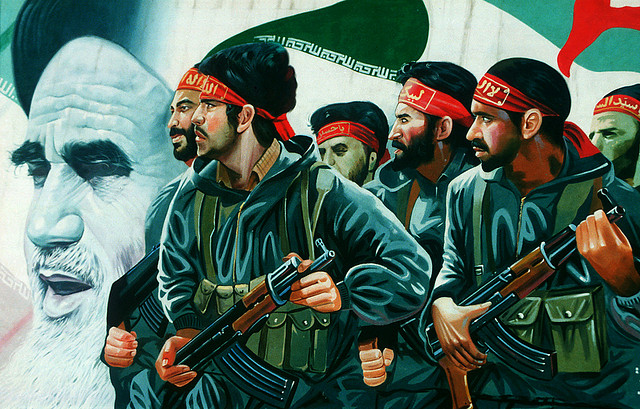The Saudi-led invasion of Yemen has opened new discussions on the Houthis, an alliance of tribal militants that are based in Sa’ada. Mainstream analysts have begun to insist that the group is nothing more than an Iranian proxy, which demands closer scrutiny. It is clear that American operatives in Yemen were themselves skeptical of this characterization until quite recently.
The Houthis are not a “proxy,” and certainly didn’t start that way. It is widely believed that Ali Abdullah Saleh felt threatened by the broad religious and tribal support that charismatic leader Hussein Badreddin al-Houthi commanded in them both. He was particularly disturbed by fierce demonstrations at the Great Mosque of Sana’a on June 18, 2004. The Houthis’ predecessor organization, the Believing Youth, had organized the protests in reaction to Israeli crackdowns during the Al-Aqsa Intifada, and the US-led invasion of Iraq.
Yemeni forces responded by killing large numbers of al-Houthi’s followers, offering a bounty for his capture, and launching major combat operations in northern Yemen. Saleh was concerned that al-Houthi was preparing to lead a tribal revolution, and situate himself as a new Zaidi Imam. Al-Houthi was killed by September, and Saleh went as far as to prevent him from being buried in Sa’ada, in case his grave became a shrine. His strategy completely backfired when al-Houthi’s supporters reorganized themselves around his brothers, particularly the relatively young Abdul Malik al-Houthi, and changed their name to “the Houthis.”
None of this has to do with Iran. However, during the Sa’ada wars, Saleh repeatedly attempted to obtain increased military assistance from the United States by arguing that the Houthis are ‘a Yemeni version of Hezbollah.’ There is now firmer evidence to support this argument, although the extent of the partnership is still debatable. At the time, Saleh’s claims were rebuked for having little to no evidence. It was believed that the Houthis’ Iranian patronage was inconclusive at best, and potentially completely fabricated.
This is clear in leaked Wikileaks documents. One cable from the US-Canada Embassy in Sana’a is especially telling. It’s dated December 9, 2009, and was sent to the Central Intelligence Agency, Defense Intelligence Agency, and Secretary of State, along with the governments of Germany and Lebanon. These actors have all been either directly or indirectly important to the current Saudi-led coalition, which includes most of the Gulf monarchies, Sudan, Egypt, and Pakistan, among others. The cable rejects Saleh’s claims that the Houthis have Iranian support, instead arguing:
“Contrary to [Republic of Yemen Government] claims that Iran is arming the Houthis, most analysts report that the Houthis obtain their weapons from the Yemeni black market and even from the [Republic of Yemen Government] military itself.”

The Houthis began exploring ties with Tehran in order to better leverage themselves against Hadi’s US-Saudi backing. However, it is wildly misleading for commentators to argue that the group is a reflection of Iranian ambitions in the region. Until a few years ago, the Houthis had nothing to do with Iran. Iran only entered the conflict much later. In a December 2009 cable, Embassy Sana’a is still uncertain:
“Little is clear about the Houthi leadership, aside from the fact that Abdulmalik al-Houthi is the rebel group’s current leader. Houthi field commanders do not seem to agree on key ideological and religious principles. The Houthis’ numbers range from the hundreds to the thousands, though it is difficult to determine how many of these adhere to Houthi ideology and how many are tribesmen who have joined the Houthis’ fight for other reasons.”
The cable is also critical of the Houthis for a number of important reasons, including its use of child soldiers. Broadly, it suggests that international actors are perfectly aware that their rhetoric about the Houthis being ‘Iran-backed militants’ is misleading. They are perfectly aware that the group’s evolution over the past decade warrants more subtlety. They are perfectly aware that the Houthis are a tribal-religious alliance reacting to decades of marginalization, and a long list of transgressions by the central government.
It seems that the coalition involved in Operation Decisive Storm doesn’t really care. The war in Yemen is being used for geostrategic considerations that have little to do with the country, such as the legitimacy crisis faced by Sisi’s Egypt, and King Salman’s Saudi Arabia. It doesn’t matter if Iran is backing the Houthis or not. The war’s sheer hypocrisy, and seemingly misguided strategic goals, are the result of a new generation of cynical elites attempting to consolidate their regional power. The alleged schemes that are being hatched in Tehran are secondary.
This plan could backfire. As Yemenis quickly grow exhausted with the conflict, it is worth wondering if the author of one Embassy Sana’a communication on July 19th, 2008 will be prophetic:
“The human suffering and economic costs of the conflict in Saada are soaring. Neither side is likely to win a decisive victory and neither has displayed many redeeming qualities that would allow it to claim the moral high ground in this struggle. Both the [Republic of Yemen Government] and the al-Houthis have frittered away opportunities for peace. The [Republic of Yemen Government] is preoccupied by the al-Houthis, allowing other dangers posed by dwindling resources, tribal unrest, religious extremism and southern discontent to fester. While, to date, reports of foreign support for each side are inconclusive, the longer this conflict goes on, the more likely it is that influential neighbors will be drawn into it, slowly turning what began as an internal disturbance into one with regional implications.”
This dynamic has helped bring down regional governments before. Many analysts believe, for example, that despite the victory of Egyptian-supported rebels in the North Yemeni Civil War, the conflict ultimately helped lead to Nasser’s downfall. It was certainly a factor in Egypt’s painful defeat in the Six Day War, as its attentions were focused on Yemen at the time, not Israel. Hadi’s newly-appointed Foreign Minister Riad Yassine has already called for a ground invasion “in order to save our infrastructure and save Yemenis under siege in many cities.” A long and bloody insurgency, especially with Saleh’s loyalists now fighting alongside the Houthis, is bound to ensue. What happens in its fallout is an open question.
Photograph courtesy of Nell Hester, and Rod Waddington. Published under a Creative Commons License.





